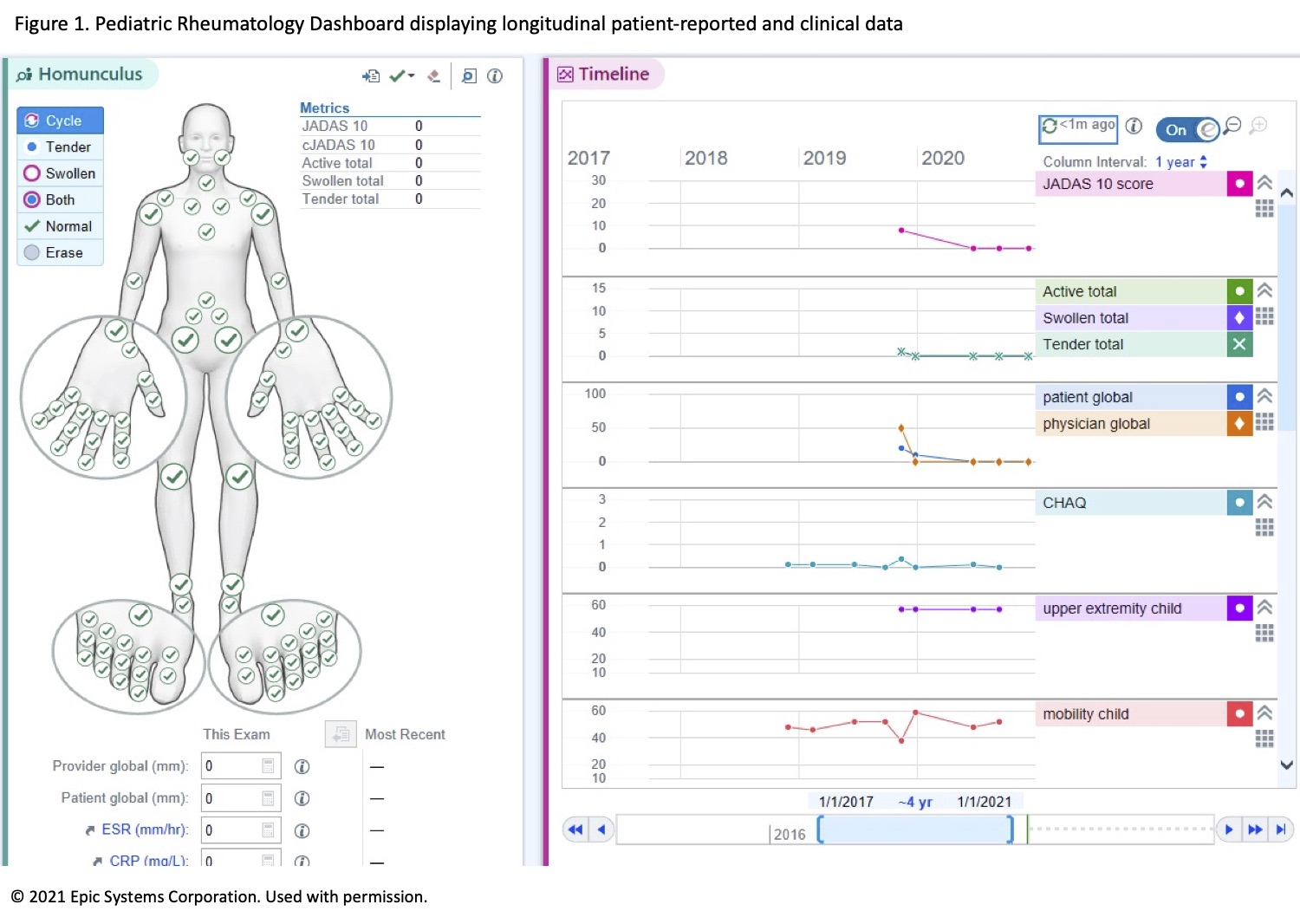Session Information
Session Type: Abstract Session
Session Time: 2:45PM-3:00PM
Background/Purpose: Health outcomes improve when people living with chronic conditions partner with their clinicians to coproduce care based on their values, preferences, goals, and the best scientific evidence. Patient-facing dashboards can be used to support coproduction by aggregating longitudinal data for review during clinical encounters, such as patient-reported outcomes (PROs), clinical data, and medications. We developed and implemented a point-of-care dashboard to enhance collaboration between families of children with juvenile idiopathic arthritis (JIA) and their clinicians and care teams.
Methods: The dashboard was developed through a co-design process including patients, parents, clinicians, and care team members. Delphi voting achieved consensus on dashboard data elements. The dashboard leveraged an Epic electronic health record (EHR) tool that was customized and integrated at four medical centers. The dashboard resides within each site’s EHR and aggregates PROs and clinical data in real-time for review by the family and clinician together (Figure 1). A convenience sample of JIA patients and parents completed an anonymous 19-item feedback survey following their clinic visit to assess the utility and usability of the dashboard. A subset of patients and parents completed 30-minute interviews with the research team. Feedback from clinicians was collected during biweekly meetings, and via surveys and interviews. Data were collected between July 2020 and April 2021.
Results: During the development phase, end-users agreed that a dashboard needed to be easy to use and trend data over time. Data elements included: (1) PROs of pain interference, upper extremity function, mobility, patient questions/concerns, medication adherence, medication side effects; (2) clinical data including active joint count, disease activity score, and liver toxicity; and, (3) current and past medications (Table 1). There was some variability in implementation among sites due to factors such as programmer availability, workflow changes, and clinic staff. During the testing phase, 101 JIA families completed a post-visit feedback survey: 93% agree or strongly agree the dashboard was useful during discussions, 89% indicated that it helped to talk about what mattered most, and 81% reported that it helped to make healthcare decisions. The Net Promoter Score, which rated the likelihood of families to recommend the dashboard to a friend or peer, was a +68 ( >50 = excellent). Families valued the ability to share questions/concerns in advance of the visit, insight into clinical assessment data used by clinicians, and visualization of data over time to inform shared treatment decisions with their clinicians.
Conclusion: Building upon basic Epic functionality, we implemented a JIA dashboard at four sites, informed by a human-centered design approach with a diverse group of stakeholders. Data demonstrated that the dashboard effectively facilitates shared decision making between JIA families and their clinicians. Additional efforts are ongoing to spread the dashboard use to other clinicians and to determine optimal use of the dashboard during telehealth visits.
To cite this abstract in AMA style:
Lawson E, Johnson L, Ahmad J, Del Gaizo V, Donaldson B, Eller J, Kimura Y, Knucken C, Lee T, Pinter C, Tabussi D, Taxter A, Van Citters A. Enhancement of Patient and Clinician Partnerships in Juvenile Idiopathic Arthritis Management Using a Point-of-Care Dashboard: Development and Pilot Testing [abstract]. Arthritis Rheumatol. 2021; 73 (suppl 9). https://acrabstracts.org/abstract/enhancement-of-patient-and-clinician-partnerships-in-juvenile-idiopathic-arthritis-management-using-a-point-of-care-dashboard-development-and-pilot-testing/. Accessed .« Back to ACR Convergence 2021
ACR Meeting Abstracts - https://acrabstracts.org/abstract/enhancement-of-patient-and-clinician-partnerships-in-juvenile-idiopathic-arthritis-management-using-a-point-of-care-dashboard-development-and-pilot-testing/


